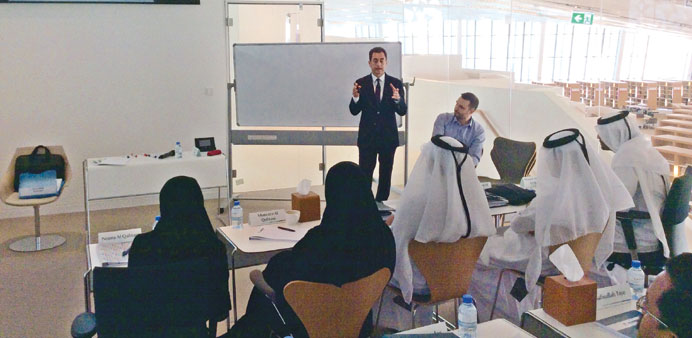By Peter Alagos/Business Reporter
French ambassador Eric Chevallier has said that the recently-inaugurated Jetty Boil-off Gas Recovery (JBOG) project in Ras Laffan serves as one of Qatar’s vital contributions to global climate change mitigation efforts.
Speaking to Gulf Times at the French embassy in Doha, Chevallier said, “We believe Qatar could really be a leader in innovation as it pursues various programmes to develop the country into a ‘green’ economy and a ‘green’ society in line with the Qatar National
Vision 2030.”
The $1bn JBOG facility, described as the “biggest environmental project in the world,” will recover the gas flared during Liquefied Natural Gas (LNG) loading at the six LNG berths in Ras Laffan Port.
The project will result in a 90% reduction in current flaring, equivalent to annual greenhouse gas (GHG) savings of 1.6mn tonnes of carbon dioxide (CO2), which is the same amount of annual GHG emissions of 175,000 vehicles. It will also provide savings of 29bn standard cubic feet (bscf) per year flaring reduction, which is enough gas to produce 750 megawatts to power 300,000 homes.
“This is exactly the kind of project that can be an element of Qatar’s national contribution to climate change mitigation,” Chevallier said, referring to Intended Nationally Determined Contributions (INDCs), a public, global commitment that outlines post-2020 climate actions.
Chevallier explained that countries worldwide committed to create a new international climate agreement by the conclusion of the UN Framework Convention on Climate Change (UNFCCC) Conference of the Parties (COP21), which would be held in Paris this coming December.
“I think Qatar will have a quite ambitious INDC, and this includes the research undertaken by Qatar Foundation, the energy efficiency programme of Tarsheed, and the ‘green’ stadiums of the Supreme Committee for Delivery and Legacy.
“This is the kind of comprehensive package that could be included as an INDC, but that is up to Qatar to decide, of course,” Chevallier stressed.
He added, “We are not promoting a uniform action plan but we are looking for an ambitious contribution from all countries, according to their dynamics and situation.”
At a conference on climate change held yesterday at the Hamad Bin Khalifa University, Chevallier delivered a lecture and stressed that “Climate change is neither a theory nor a potential risk, but it is already a reality.”
“No one is spared from climate change. In Qatar, the imminent threats include growing desertification, water scarcity, the acidification of oceans will prevent desalination of seawater, and the rise in sea levels.
“We believe there is a multi-sectoral effort to mitigate, curb the dynamics, and adapt to the effects of climate change,” Chevallier said.
In preparation for COP21, Chevallier said the Paris Climate Alliance has created a four-pillar strategy: a universal and legally-binding agreement to keep global warming below 2 degree Celsius, an ambitious INDC, establishing a “green” fund, and setting up an action agenda to foster civil society commitment.
The ambassador also said France has passed a law that aims for a reduction of GHG emissions (40%), use of fossil energy (30%), and increase in share of renewable
energies (32%) all by 2030.

Eric Chevallier delivering a lecture on climate change at the Hamad Bin Khalifa University yesterday.
